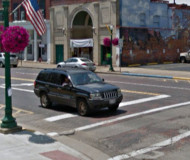Article from: www.thenewspaper.com/news/66/6644.asp
2/27/2019
Ohio Court Declares Stopping Slightly Over The Line Illegal
Stopping a few inches over the line is now a traffic violation under Ohio Court of Appeals ruling.
 Ohio law is so strict that courts consider a momentary "bobble" over a lane line to be a traffic offense that can result in being pulled over and cited. A three-judge Court of Appeals panel extended this precedent last month to declare that stopping at a red light with the front tires just over the stop bar is a violation.
Ohio law is so strict that courts consider a momentary "bobble" over a lane line to be a traffic offense that can result in being pulled over and cited. A three-judge Court of Appeals panel extended this precedent last month to declare that stopping at a red light with the front tires just over the stop bar is a violation.
On March 2, 2018 Evan M. Levine was driving in the city of Marietta. He made a right turn from Second Street directly into the outside lane of Putnam Street, rather than into the lane nearest the curb. Ohio State Highway Patrol Trooper Jordan Hutton saw this and decided to follow as he came up to Third Street.
"I noticed the vehicle did stop at the white stop bar but his front tire stopped beyond that," Trooper Hutton testified. "His front tires stopped beyond the clearly marked white stop line, right prior to the crosswalk at the flashing red light."
During the stop, the trooper gathered sufficient evidence that Levine was drunk and arrested him. At trial, the Marietta Municipal Court threw out the case against Levine after watching the dashcam video and finding that the traffic stop was illegal. Prosecutors did not like this outcome, so they brought the case to the Court of Appeals.
For the stop to be valid, the police officer must articulate facts that would allow "a person of reasonable caution to believe that the driver has committed, or is committing, a crime." The three-judge appellate panel found the driving conduct that the trooper observed did constitute violations of the law. In so doing, the judges cited another appellate court's opinion in finding that the statute was ambiguous and needs to be reinterpreted so that the word "at" really means "before."
"To comply with the statute, a motorist must stop his or her vehicle before any portion of his or her vehicle crosses the edge of the stop line that is furthest from the front-most portion of his or her approaching vehicle," Judge Peter B. Abele wrote for the appellate panel. "We hold that the statutory requirement to stop 'at a clearly marked stop line' requires a driver to come to a complete stop before the vehicle comes into contact with the stop line."
As a result of the ruling, Levine will stand trial for driving under the influence. A copy of the ruling is available in a 70k PDF file at the source link below.
Source: Ohio v. Levine (Court of Appeals, State of Ohio, 1/22/2019)
Permanent Link for this item
Return to Front Page
 Ohio law is so strict that courts consider a momentary "bobble" over a lane line to be a traffic offense that can result in being pulled over and cited. A three-judge Court of Appeals panel extended this precedent last month to declare that stopping at a red light with the front tires just over the stop bar is a violation.
Ohio law is so strict that courts consider a momentary "bobble" over a lane line to be a traffic offense that can result in being pulled over and cited. A three-judge Court of Appeals panel extended this precedent last month to declare that stopping at a red light with the front tires just over the stop bar is a violation.